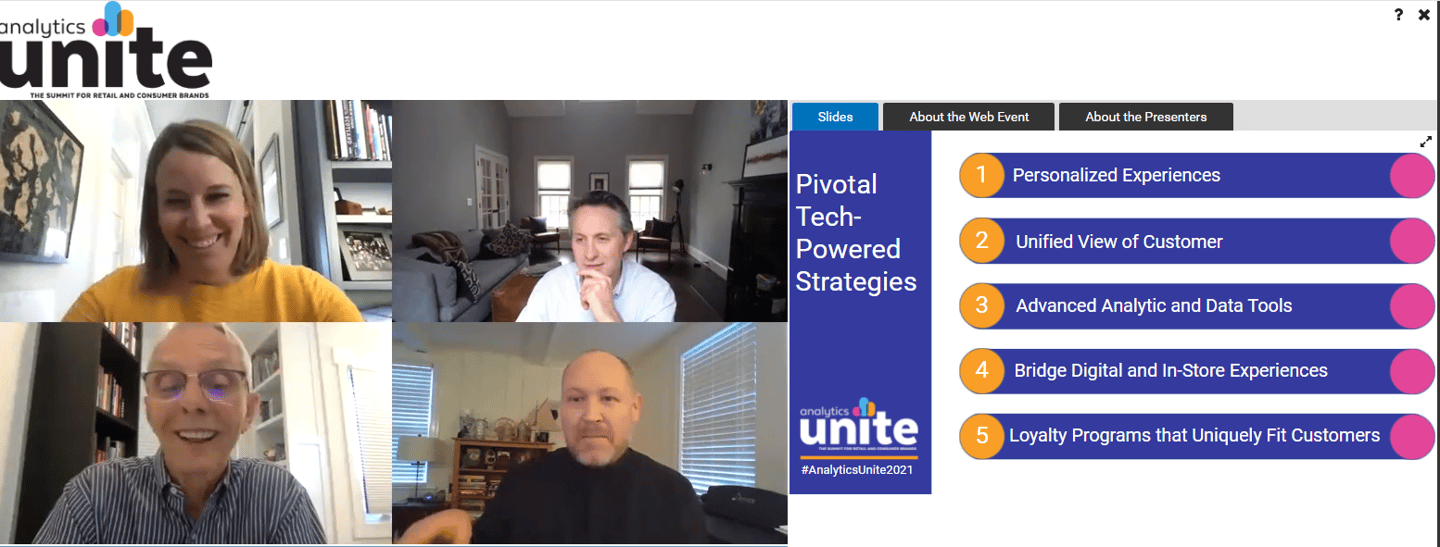Forrester Paints Importance of Getting Personalization Right
“We’re focusing on tech-powered strategies that will deliver success if delivered effectively,” noted RIS editor-at-large Joseph Skorupa, opening up a lively panel discussion on the “5 Pivotal Tech-Powered Strategies” at Analytics Unite 2021.
David's Bridal’s chief digital experience officer Lizzy Ellingson; Forrester Research’s VP, principal analyst, Brendan Witcher; and Ocean Spray’s chief digital & technology officer Jamie Head joined him on the virtual stage to examine and debate five strategies:
- Personalized Experiences
- Unified View of the Customer
- Advanced Analytic and Data Tools
- Bridge Digital and In-Store Experiences
- Loyalty Programs that Uniquely Fit Customers
“Personalization is the name of the game for us,” said Ellingson, noting that David’s Bridal is tailoring and crafting the experience from taking a quiz on the best bridal dress, to what the retailer is marketing to them on the computer. “How do you personalize a loyalty program” should be an action item she noted.
Witcher chimed in to note that 89% of companies and digital executives say “we’re doing personalization,” but only 40% of consumers say “the communications I get from companies are relative to my tastes and interests.” So who’s right, he posed. The answer is the consumer.
“It’s not personalization if you’re not getting it right. It’s just marketing,” he said, noting retailers are too quick to check the personalization box.
Regarding having a unified view of the customer, Ellingson noted that the view is important to not only digital touchpoints, but from a store perspective to see “what regions are heating up” and “what’s going on in the news right now.” How do these factors impact personalization at the store level?
“We need to make sure, ‘how do we curate the journey of the consumer throughout the different channels using the data and the unified idea of the consumer, to give them the right content to build the story as they go through the journey,’” posed Head.
On data, Witcher noted one of the exercises he gives retailers is “if we knew X we could do Y.” For example, If you knew a customer likes to go online first, you could offer a buy-online-pickup-in-store offer.
“What I find is most companies don’t have a proactive data strategy,” he said. “The big dirty secret of all this is companies have the mindset ‘we can’t talk to the customer.’” Customers love to talk about themselves if they get value.
Our very best store associate would talk to the customer, he pointed out. “We need to talk to our customers digitally, the same way we would do in stores.”
On bridging the digital and in-store experiences, Ellingson talked about how David’s Bridal had to do this when the pandemic started and the retailer’s stores were closed. Appointments are so important for bridal gowns, because they can be the most expensive, most emotional purchase a customer makes. David's Bridal had to innovate quickly on digitizing the appointment.
“We had associates on zoom, showing gowns, the dress and material,” she said. They could check out directly on the phone through Zoey, a communication platform. Then, to really bring the dress to life, the retailer leaned into augmented reality and virtual reality.
Shoppers can hold up the dress and project it into the room. So then, a virtual stylist could send a shopper the dress and show it in the room they are in.
For the last strategy, Skorupa asked how do you make your loyalty program work? Witcher noted the most successful retailer loyalty program is Amazon Prime and that its membership alone makes more than most retailers.
“No one ever signs on to Amazon,” he pointed out, because Amazon has convinced you that by staying logged on it will give you value. A loyalty program is about giving enough value for the customer that they want you to know who they are.
Ellingson gave the example of David Bridal’s new loyalty program it rolled out in December. “We don’t want someone buying a wedding dress every year, so the question is how do we get recurring revenue,” she asked. To answer this, the retailer focused on how to reward loyalty through the customer’s event. Shoppers can send a loyalty number to everyone coming to the event. Through those points they can get a free honeymoon. So we are giving them something, she said, but we’ve seen incredible events so far.
“You’re giving people a way to get what they really want, everyone to contribute to the honeymoon,” Witcher agreed to close out.


